 by Bob Fromer
by Bob Fromer
The summer of 2011 was an important and busy time for the GB Fastpitch programme.
At home, GB players at all age levels, both male and female, were able to play in a rejuvenated 12-team London Fastpitch Softball League, and many of them took part when the London Cup, an international invitational tournament, was revived after a five-year absence and held at Richings Park at the end of May.
Official competition
Internationally, official competition for GB Fastpitch teams was as follows:
The GB Women's Team was invited to the 6th World Cup of Softball in Oklahoma City, where they played the top four teams in the world (the US, Japan, Canada and Australia) plus the Czech Republic. The team then flew direct to Italy for the European Championships and World Championship Qualifier.
The GB Junior (Under-19) Men's Team, whose revival was due almost entirely to the efforts of BSUK South East Regional Coach Stan Doney, played in European Championships in the Czech Republic for the first time since 2004.
The GB Junior (Under-19) Women's Team travelled to Vancouver, Canada to play in one of the world's most prestigious tournaments at that age level, the Canadian Open Fastpitch Futures Gold Tournament, competing against some of the top travel ball teams from the US and Canada plus other junior national teams. Though it was an expensive tournament for the players and their families, the Canadian Open was chosen as an ideal preparation for next summer's European Junior Championships.
The GB Cadette (Under-16) Girls' Fastpitch Team played in European Championships on the outskirts of Antwerp in Belgium.
There was also some unofficial competition for the GB Minime (Under-13) Girls' Fastpitch Team -- a weekend in Alkmaar in the Netherlands at the end of the summer to play against local U-16 and U-13 teams.
So how did GB teams do on the international stage?
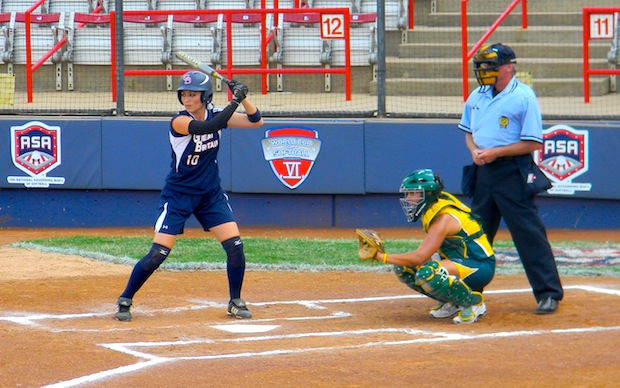
The GB Women finished with a 7-3 record at the 6th World Cup of Softball, qualifying for the 2012 World Championships
GB Women
The GB Women beat the Czech Republic twice at the 6th World Cup of Softball in Oklahoma from July 21-25 and played much better against the world's top teams than they have ever done before. GB only lost 6-4 to Canada and might have won the game, and managed an amazing 13 hits and six runs -- including two home runs -- in losing to Japan. Against the USA, GB played the Americans absolutely even for three innings before succumbing to an offensive outburst by the USA -- the only really bad inning the team had in Oklahoma.
The GB Women then achieved their major goal for the summer at the European Women's Championships in Italy from July 31-August 6: qualification for the 2012 World Championships by virtue of a third place finish. Only a pair of tough 1-0 losses to Italy prevented the GB Team from reaching the final after having the toughest draw and the toughest schedule in the tournament. They ended up with a 7-3 record.
At both tournaments, the team played polished and attractive softball with a confidence born of experience, since the core of the group has been together for the past five years. The fact that the GB Team was second in fielding at the World Cup, behind only Japan and ahead of the US, Canada and Australia, says a great deal about the quality of softball the team played, especially considering that, as with many GB Fastpitch teams, the full squad only comes together about a week before a major competition, with many players having not seen each other for over a year.
The breakdown between GB-based and overseas-based players in what was a small squad this year was about 50:50, and while the overseas-based players tended to be the starters, there were a number of times in Oklahoma and Italy when four players who live in the UK were in the starting line-up, including Academy graduates Steph Pearce and Ali Parkerson.
GB's best position player over the course of the two tournaments, both in terms of offensive stats and some spectacular play in the outfield, was Laura Thompson, who lives in the UK and came up through the GB youth programmes before leaving to play college softball in the United States. Laura plays the game with the kind of grace, joy and determination that should be an example for every player, and she will cherish her five hits in six at-bats against the US and Japan in Oklahoma.
As always over the past few years, however, GB success was founded on the pitching of Stacie Townsend, an extraordinary athlete with a huge dedication to the GB cause despite her American origins. Stacie was the number one pitcher for all four years of her college career at the University of Texas El Paso, but she doesn't throw nearly as hard as many of her NCAA Division 1 peers. Instead, she relies on movement, change of speeds, location and intelligence and watching her deploy these weapons to get hitters out is like watching a chess game in action. Stacie has been with the GB Women's Team since she was a 17-year-old high school player back in 2005, and she has led the team to most of its greatest achievements.
So the GB Women's Team had a very successful summer. Head Coach Hayley Scott said: "They are the hardest-working and most amazingly cohesive group of athletes I have seen and they love playing for GB. I am so proud of each member of this team, both past and present, for getting us twice to the World stage. It is an honour to work with such amazing staff and players."
But the future of the team is uncertain.
The international calendar has been adjusted for next year so that many of the top national teams in the world -- and Great Britain is now among them -- will be able to play in the World Cup of Softball in Oklahoma, followed by the Canadian Open International Tournament in Vancouver and then the 13th ISF World Championships in Whitehorse, Canada, not far from the Alaska border.
But it's going to be difficult to do any of this without money, and the GB Women's Team has now exhausted all of the funding left over from 2010, when almost £100,000 was raised through a one-off windfall of sponsorship and gifts. Unless a similar miracle can occur over the next few months, the World Championship place that the team earned in Italy may be in jeopardy, and the group of players that has taken the GB Team to unprecedented achievements over the past few years may never reconvene.
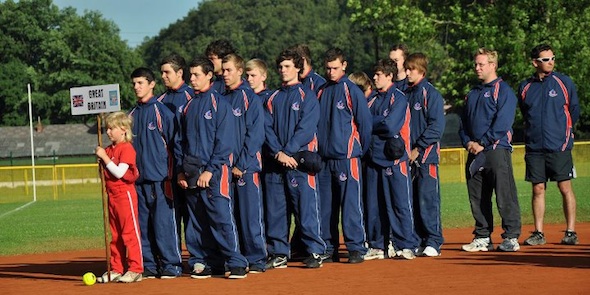
The GB Junior Men placed fourth out of five teams in the 2011 European Junior Men's Championships
GB Junior Men
Before this summer, the last time that a GB Junior Men's Team played in a European Championship was 2004. The team and the programme died away after that, despite the continued successes of a largely overseas-based GB Men's Team (currently ranked third in Europe and eighth in the world).
A GB Junior Men's programme was revived in 2010 through the tireless efforts of BSUK's South East Regional Coach Stan Doney, who found young players from here, there and everywhere and set about training them to play on a European stage. Many of them played on the Berkshire team in Division 1 of the London Fastpitch Softball League this year, and the team entered the otherwise all-female London Cup Tournament held at Richings Park over the May Bank Holiday to get further game experience.
When they got to the European Junior Men's Championships, held from July 11-16 at Kostelec nad Orlici in the Czech Republic, the GB team won two games and lost six and finished fourth out of five teams in the competition. But that was a pretty fair showing for a group of players with almost no competition experience, and certainly none at that level.
The group of players that Stan Doney assembled and coached have a lot of athleticism, speed and power and now need to hone their softball skills. As always, GB could have gone further with better pitching (the team gave up almost 14 runs a game on average). Tom Priscott, Josh Peat, Travis Brown and Carl Sharpe all did a great job in terms of commitment and never giving up and they all throw hard -- but they need to learn more pitches and they need to throw more strikes.
Stan Doney said, "The GB Under-19 Men have gained the respect of their opponents despite the reputation that Britain seems to carry as a 'slowpitch only' softball nation. We weren’t expected to win a game and instead we were only a few errors and key plays away from playing for second place."
With interest in fastpitch softball growing, it should be possible for the GB Junior Men's Team programme to grow and develop. Many of the players who went to the Europeans this summer will still be within the age group in 2013.
And for the first time ever, there is now a group of young male fastpitch players in Britain who can begin to feed into the GB Men's Team programme -- and hold their own.
This is a considerable achievement, and a boost for British fastpitch that goes far beyond the team's results at the Europeans.
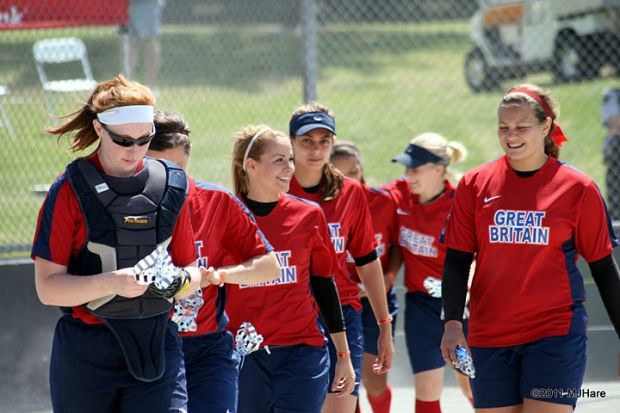
The GB Junior Women faced stiff competition at the Canadian Open Fastpitch Futures Gold Tournament in Vancouver
GB Junior Women
The GB Junior Women's Team went to the European Junior Championships in Vienna in 2010 with high hopes. But the combination of a tough schedule, some bad luck and the fact that GB teams always take a while to blend overseas and home-based players meant that the team failed to make the playoffs and could only finish ninth. That was effectively four places higher than in 2008, but well below expectations.
Nevertheless, it was a young GB Team that went to Vienna, with most of the players still eligible to compete again in 2012, so it seemed sensible to use the off-year to give the team some experience of high-level competition. And it doesn't come any higher than the Canadian Open Fastpitch Futures Gold Tournament played near Vancouver, Canada (formerly called the Canada Cup).
The opposition at this tournament consisted of a few other junior national teams from around the world, but primarily high-level American and Canadian Under-18 Gold travel ball teams. These teams have a large number of players bound for top US colleges, they play 60-80 games a summer, and they represent the cream of a large North American crop.
So the question going in was whether the GB Team, consisting of nine home-based and four overseas-based players, could possibly hold its own in that company -- especially considering that three or four of the best GB Junior players couldn't make the trip for one reason or another.
What happened was encouraging -- and interesting. Apart from a couple of friendly games played at the beginning of the tour when the team was still jet-lagged and coming together, the GB Juniors were in every single game they played, had chances to win all of them, never lost on the mercy rule -- but won just one game.
In terms of ability, the GB players were able to compete more or less on level terms with the teams they played, and that was a pleasant surprise. But lack of game experience and defensive inconsistency were the reason they didn't win more games.
GB players made some fine defensive plays during the tournament, particularly Amy Wells, Susie Hall, Amy Trask and Sara Robb, while Carling Hare and Ellie Pamenter pitched well and Lauren Bromage and Nicole Ratel were solid behind the plate. But the team also committed 36 errors in nine games and almost half the runs scored against them were unearned. You can't give good teams that many free runs and win.
Another deficiency may have been a lack of team cohesion. Some of the GB Junior players may not yet have fully grasped the old cliche that there is no "i" in "team".
During the course of the tournament, there was a Head Coach transition from Hayley Scott to BSUK North West Regional Coach Liz Knight, who will take the team to the 2012 European Junior Championships in Belgium next July.
After the experience in Canada, Liz and the GB Junior Women should be able to look forward to the tournament with real confidence, and with hopes of achieving GB's highest-ever placing at this event.
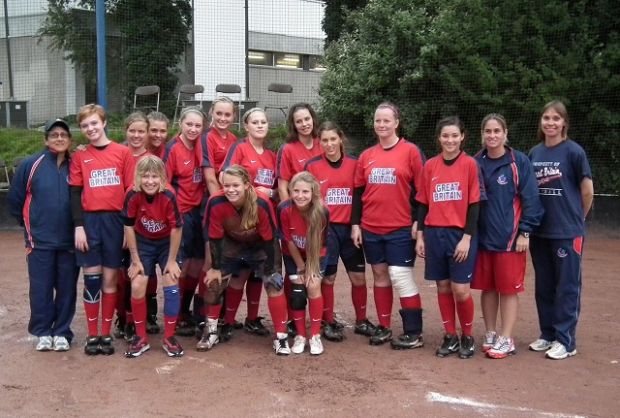
The GB Cadettes battled fiercely for 7th place at the 2011 European Cadette Championships in Belgium
GB Cadettes
The GB Cadettes went into the European Cadette Championships played from August 8-13 on the outskirts of Antwerp in Belgium with a number of disadvantages.
First, they had a tremendous struggle over the summer just to find enough players who could go to the tournament, after a large number of potential players dropped out. They wound up with a squad of 13, but one player was there just to learn, another was 12 years old and most had little or no competition experience.
The team's Head Coach, Sarah Jones, was away with the GB Women's Team for several weeks before the Cadettes went to Belgium, and she and Assistant Coach Joss Thompson (mother of GB Women's Team player Laura Thompson) were only able to join the team the day before the Cadette Championships started. And Sarah's broken arm (sustained when she was hit by a pitch in the World Cup in Oklahoma) limited some of the practical aspects of what she could do as a coach.
Because one team dropped out in the spring and the tournament pools were re-arranged, GB wound up in a "Group of Death" that included the 2009 champions Russia as well as Italy and the Czech Republic. With only two teams from groups of five and six going forward to playoffs (a terrible format that the ESF seems to like), GB's chances of getting to the latter stages of the competition were always going to be slim to none.
So while the GB team duly received a battering at the hands of the Czechs, Italy, Russia and Spain, they did tremendously well to win their four other games and finish in seventh place (out of 11) with a 4-4 record.
A 4-2 win over Germany in the latter stages of the tournament was a huge achievement, and in their last two games, the GB Team hung on for exciting 6-5 wins over Serbia and Slovakia.
GB success at the tournament was based on some dogged pitching by Ellie Pamenter and a brave catching performance by team newcomer Gabry Sassoli, but there was also a surprising amount of offense. Chloe Wigington hit .429 for the tournament, Ellie Pamenter and Lucy Hall both hit .400 and Gabry Sassoli and Grace Dickinson both hit .300 or better, while Amy Trask was close on .294. A overall team batting average of .272 was no mean achievement -- especially after the team failed to record a single hit in its first two games against the Czech Republic and Italy.
The GB Cadettes suffered in this tournament from the curse that afflicts all GB fastpitch teams -- a lack of competition experience compared with most of their opponents. But that makes their .500 record in Belgium all the more remarkable, and is a credit to their spirit in the face of adversity.
As with the GB Juniors, the future for this team and many of these players looks bright.
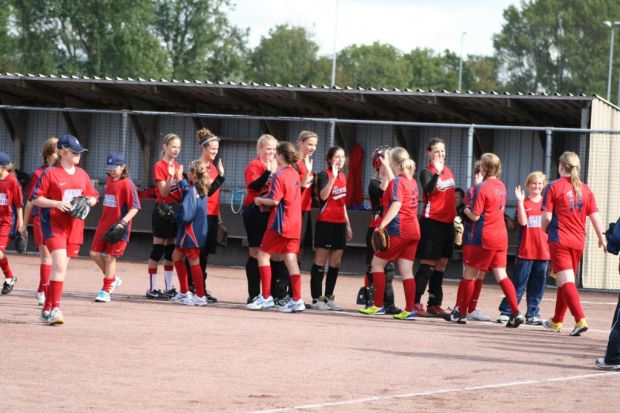
The GB Minime (U13) Team travelled to the Netherlands for some high-level games in the European competition off-year
GB Minimes
The GB Minime (Under-13) Team came third out of four teams at European Championships in Turkey last year, and didn't have an official competition this summer.
But with an influx of new players, there was an urgent need to get the team some kind of competition experience, and so they travelled to Alkmaar in the Netherlands on the August Bank Holiday weekend where they played and lost two games against a local Under-16 team and then beat a local Under-13 team in a 14-13 thriller under new Head Coach Caroline Champion.
The team also rented bicycles to get around (covering more than 40 miles over the weekend) and bonded extremely well.
Next year, instead of a European Minime Championship, the ESF has created the Romeo Massimo Youth Trophy for this age group, a competition in which countries can send national or club teams (or both) and where nationality rules may be relaxed. The tournament will be played in Collechio near Parma in Italy in late August, and the ESF's idea is to get as many Under-13 players in Europe there as possible.
One or more teams from Britain will certainly be there, and with more young girls coming out of BSUK fastpitch development programmes and the prospect of a youth fastpitch league next year, GB fastpitch programmes seem to be blooming at every age level.
What it all means
None of the GB national fastpitch team programmes are externally funded, and apart from generous funding provided by the BSF that covers entry fees to official competitions and a range of infrastructure items, most of the costs of competing overseas are borne by players and parents apart from whatever fundraising can bring in. In addition, all of our teams struggle for competition experience and we are just beginning to develop a decent (if strange) domestic league. And yet, look how well we do!
In a slowpitch-dominated country, our national fastpitch teams are punching way above their weight, and this is mainly down to the dedication of players and parents -- but especially to some key people who put in huge amounts of time and expertise to keeping fastpitch going and improving.
Hayley Scott has probably worked hardest of all to promote and develop fastpitch in the UK at every level over the past five or six years, but many other people have made major contributions on and off the field including Stan Doney, Joss Thompson, Paul Cooper, Mark House, Spencer Suckling, Bob Fromer, Mike Jennings, Vicky Hall, Robbie and Dawn Robison, Michaela and Mark Wigington, Teri and Bob Parkerson, Carmel Keswick, Sarah Jones, Caroline Champion, Liz Knight, most of the London Angels, Stella Ackrell, Steph Pearce, Laura Thompson, Celine Lassaigne, Kat Longshore, Moe Flett, John and Moi-Maree Brown, Larry Rushin, Michael Baron, Michael Williams, David Hurley, Luis Arrevillagas, Wesley Knapp and going back in fastpitch history to Bobby Simpson, Tanya Price, Aisha Arnold, Annie McLaughlin, Duncan McLean, Mark Kerr, Craig Montvidas, Ian Van den Berg, Emily Clifford, Steph Jardine -- and many, many others to whom apologies are due for not mentioning them.
The London Fastpitch Softball League grew from five to 12 teams between 2010 and 2011, and with more and more slowpitch players giving it a go, and fastpitch players from everywhere coming out of the woodwork, the league in 2012 should grow even further -- or at least solidify its gains.
Meanwhile, the Quixotic adventure of trying to develop competitive GB fastpitch teams with no money and a tiny player pool will hopefully go on, powered by love of the game and a refusal to admit that it can't be done.
